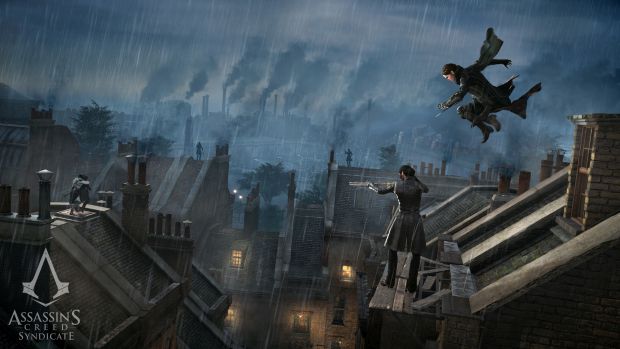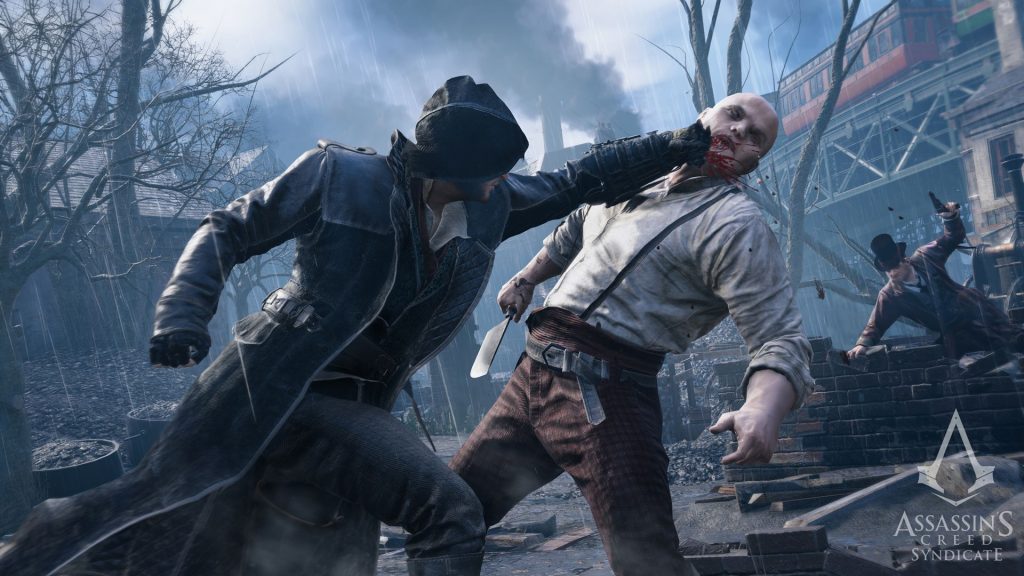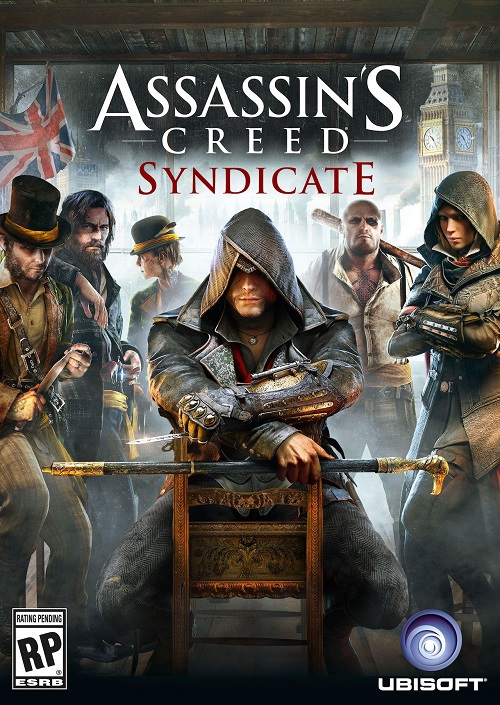
There’s no denying Avatar: Frontiers of Pandora and Star Wars Outlaws have underperformed commercially. Whether these titles underwhelm you or not, the developer’s open world games have unfortunately become poster children for cookie-cut experiences; a paint by numbers trawl through worlds, lusciously designed, but hampered by middling stories and box-checking grind. In many ways, the latest entry in the series Assassin’s Creed Shadows is make or break for the developer given the spate of redundancies affecting the industry since the pandemic. This feature isn’t about the developer’s current state, of course, but it’s worth beginning with this context because arguably the developer’s downturn started with 2015’s Assassin’s Creed Syndicate and then things started to go worse after Assassin’s Creed Origins and Odyssey.
Arriving just twelve months after the much-maligned (although later redeemed) Assassin’s Creed Unity, Syndicate whisked players back to Victorian era London, a setting which holds up as one of the series’ most visceral but with gameplay which didn’t reinvent the wheel over its predecessor. Still, Syndicate possessed enough distinction to sell well, but much like Frontiers of Pandora and Outlaws its commercial performance was lacking. The developer put this down to series fatigue – too many AC games in too-short a time – but even players who weren’t burned out swerved this one given Unity’s insipidness.

Looking back a decade, Assassin’s Creed Syndicate can be re-framed as an overlooked entry in the series. A game downgraded by reputation rather than reality. The aforesaid portrayal of London was sublime, but the experience’s stealth was stellar, its main characters decent enough at getting you to care for them, it’s switch-up to period-correct weaponry excellent. In short: it was a blast to play. Because of its shortcomings, of which there are numerous, Assassin’s Creed Syndicate kickstarted the developer’s desire to reboot the series but blaming Syndicate for the series’ break, however, is unjust.
Let’s take a deeper look at 1868 London, a mix of heavy industry, smog-filled skylines, and muddy areas underpinning globally recognized landmarks. The Tower of London, Palace of Westminster, the Houses of Parliament, Big Ben, St Paul’s Cathedral, these architectural jewels in the British Empire’s crown are wonderfully recreated here. This place feels like London, but these landmarks get the city closer to an exact replica than any other historical setting video games have visited before. And bustling are these streets too, although notably they aren’t as packed with pedestrians as Unity’s Paris which, likely, was a decision made by developer to the minimize performance issues which plagued Syndicate’s predecessor. And a good decision it turned out to be for gameplay purposes too. The city’s wide streets provide breathing room for the game’s freshest traversal gimmick – the very Batman-esque grappling hook.
See, whilst London is indeed an excellent setting for Assassin’s Creed, the design of its chimney-heavy rooftops doesn’t exactly foster freewheeling parkour. The grappling hook, with associated zipline, proved essential in zapping between buildings, scooting above the chasm of wide London streets, maintaining free running so integral to the series in the finest way possible.

The city plays playground to Syndicate’s brother-sister duo, twins Jacob and Evie Frye, the former being a brute force pragmatist hellbent on reclaiming London’s boroughs from Templar oppression whilst the latter is more nuanced, a true assassin of the shadows more calculated in her approach to tracking down the enemy. Both characters contrast very well in their approaches even though the game doesn’t go far enough to distinguish each in terms of skills and attributes. Jacob’s combat-centric combos and Evie’s stealth orientated invisibility cloak really the only defining features for a pair which function largely the same.
Still, their opposing worldviews makes for an interesting narrative, a structure in which you spend more of your time chasing Jacob’s goals of unifying his city, amassing a gang to take down small time Templar’s who’re operating with impunity at street level. To be clear, the game is better for aligning more closely to Jacob. At times it feels as though Evie was an afterthought shoehorned in during mid-development. Clawing back fragments of the city as per Jacob’s ideal – whilst a tried-and-tested formula for video game activity – seldom feels tedious or like busywork due to both protagonists, their sibling rivalry, and the meaningfulness behind reclaiming London’s streets.
The developer opted to forgo swordplay in favor of street brawling combat in Syndicate but, alas, whilst they addressed Unity’s numerous pitfalls combat unfortunately felt like a step down. There is still fun to be had, what with the aforementioned period-correct weaponry: brass knuckles, compact revolvers, cane-swords, and Nepalese-imported Kukri blades providing a unique spin to melee combat.
There was also more variety in combat animations but the act of 13-combo-ing gangsters became a repetitive, button mashing affair; morphing enemies into hard-wearing punch bags wasn’t the most fulfilling way to boost the challenge of Assassin’s Creeds combat – a facet which had at times endured criticism for being too easy. Fact is, Assassin’s Creed Syndicate’s hand-to-hand-focused combat would have been better presented were there more weight behind every right hook. Still, eschewing blocking and parrying for dodging, the ability to line multiple opponents up to mix in multi-kill combos and execution animations was an enjoyable process providing your twin assassins were suitably levelled up.
Plus, Syndicate excelled in stealth. Bread and butter for a series of action stealth games, for sure, but Jacob and Evie’s traipses through Victorian London’s criminal underworld was made all the more enjoyable by arguably the best stealth mechanics that had appeared in an Assassin’s Creed game to that point – perhaps not including Black Flag though.
What made stealth a blast here was the range of viable options for remaining undetected: crouching in cover before utilizing distracting whistles or tossing knives at unsuspecting guards’ faces or killing from cover altogether. Incapacitating voltaic bombs – invented by NPC Alexander Graham Bell, no less – were a useful tool for stunning enemies. A neat mechanic was the ability to ‘kidnap’ opponents, to effectively use them as a cloaking device by moving around a populated area with your victim in tow, their immediate proximity to you rendering you invisible to other enemies that’re loitering the same area.

Furthermore, bringing all these stealth skills to Syndicate’s excellent black box missions was a constant blast. Returning from Unity, these linear-in-nature missions whereby our protagonists are tasked with taking down a high value Templar target were expanded to greater effect than in Unity via multiple points of infiltration, ally and enemy locations, plus unique takedowns for each assassination target. Their design ensured them as some of the most rewarding missions in any Assassin’s Creed game, and whilst Jacob’s brute force approach was seldom unenjoyable, playing these missions as the more calculating Evie – if possible – was the way to go.
All in all, Assassin’s Creed Syndicate does suffer a negative reputation based upon what came immediately before it but re-assessing on its own merit a decade later reveals an entry in the stealth action series that’s well worth revisiting due to an excellently realized setting, likeable protagonists, and some of the best stealth mechanics seen in any Assassin’s Creed game. Will the return of dual protagonists in the upcoming Assassin’s Creed Shadows herald a changing of the seasons for the the developer’s beleaguered reputation? Time will tell, but if Shadows adopts a bespoke, ‘of the time’ approach to its weaponry and combat, plus harbors an intriguing relationship between its player-characters akin to Syndicate then the developer stands a good chance making Shadows successful.
Note: The views expressed in this article are those of the author and do not necessarily represent the views of, and should not be attributed to, GamingBolt as an organization.















